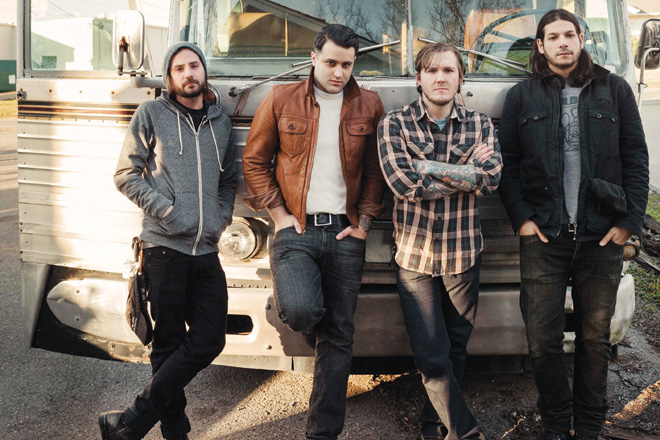
Alex Rosamilia, Alex Levine, Brian Fallon, Benny Horowitz
THE GASLIGHT ANTHEM
For their latest project, the folk-punk rockers go bigger and bolder
Accolades piled up fast after Gaslight Anthem’s 2010 album, American Slang, but the New Jersey band shut out as much of the hype as possible to focus on writing music for their latest, Handwritten. “Really, you just want to make great songs,” says drummer Benny Horowitz. “That’s where it starts.” In pursuit of a bigger, fuller sound, the band recruited producer Brendan O’Brien (Pearl Jam, Bruce Springsteen). One of the results is singer Brian Fallon baring more of his soul in the lyrics as compared to the oft-veiled material on the group’s two previous albums. Horowitz gives us more Handwrittendetails.
What was the goal with Handwritten?
We wanted to make a record that was bigger in sound and scope. If there’s any complaint we had about American Slang, it’s that it was a little thin at times. This time we added another full-time guitar, which filled out the sound. We also made an attempt to strip away the metaphor of what the lyrics used to be rooted in—seeing stories through the eyes of another person. With this record, they’re more direct, straight from Brian’s mouth.
Did the band’s heightened fame influence the creative process?
It’s important to stay focused on the task at hand and not worry about those things. Luckily, the way we structured our record deal means nothing leaves our camp. We’re not getting opinions from a million people, and we don’t have to answer to anyone or change anything if we don’t want to. The songs were written in a room with the five of us, and we threw out a lot of ideas and songs we didn’t think were good. By the time we were ready to present a song to a producer, we were pretty stoked about it. There are some things you can control as a band: the songs you write, how they’re recorded, how you sound live and how you present yourself. Everything else is kind of out of your hands.
Was making the final cut difficult?
There were ideas and demos that got tossed before we even got to the production process. Brendan came up to New Jersey for three days the month before we recorded to hear what we had. We had nine completed songs ready to present, but that’s out of 20 or 25 we had before we narrowed them down. There was one we brought to the studio that we thought was one of the better songs. But after we recorded it, it just sounded bad—that was a big disappointment. A song might be tossed, but if there’s a certain part of it that’s great, that idea could end up sparking a new song. That happens fairly often.
Why did you select Brendan to produce?
Even before we signed, his name was being kicked around. It was an easy decision—his body of work speaks for itself. Each of us has probably 10 albums in our record collection he’s worked on. But when it came to the choice, it was really personality-based. It was apparent early on he’s not some big-time music producer ego guy. We ended up talking baseball for 20 minutes.
How did Brian’s Horrible Crowes solo project affect the recording process?
His working in a solo capacity definitely helped. With Gaslight, Brian’s used to writing songs collectively, but Horrible Crowes was his record, and the process made him better. I think the lyrics on the new record are easily the best we’ve ever had.
–Eric R. Danton



comment closed